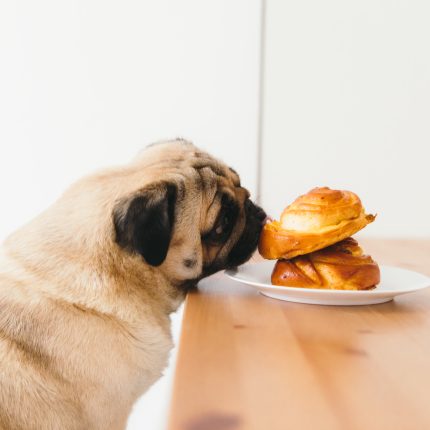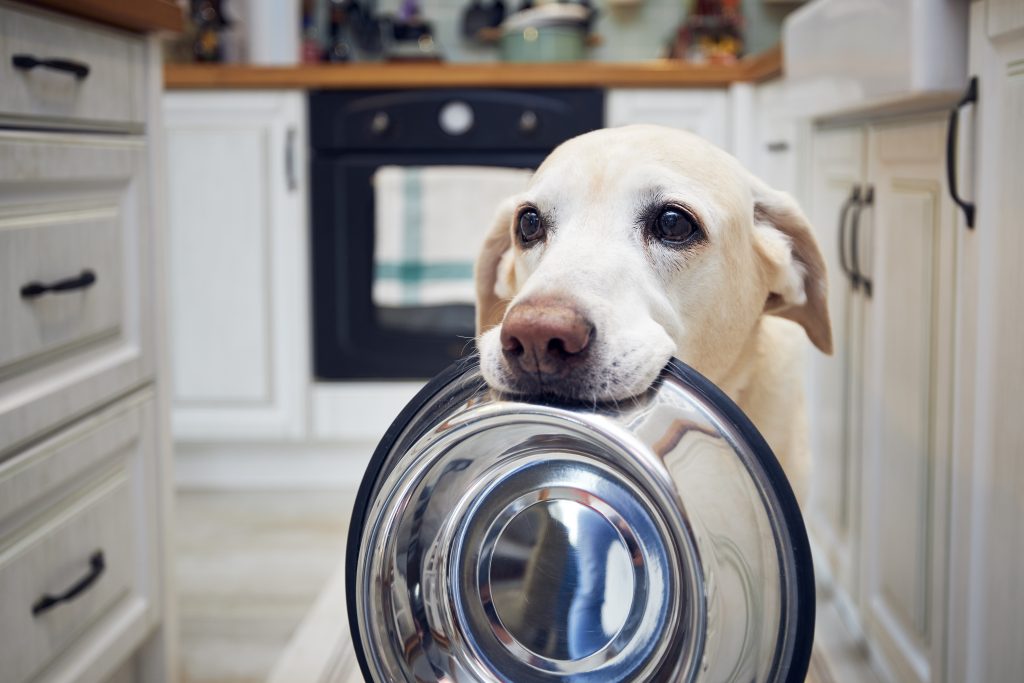Table scraps for dogs – the dos and don’ts.

Table scraps for dogs – the dos and don’ts of sharing food with your dog.
We can’t deny it, it is so tempting to share food with your pet. Especially when they hit you with those puppy dog eyes at the dinner table; they’re hard to resist! And while pet owners have long been told that feeding table scraps to your dog should be avoided, you may be surprised to learn that this isn’t always the case. In this article, we’re breaking down the dos and don’ts of feeding table scraps to your pet. Keep reading to learn what human food our dogs can benefit from eating, and which foods we should keep to ourselves.
What human food table scraps can my dog safely eat?
Fresh, whole foods are great for our pets! The idea that all “human food” should not be given to dogs does them quite a disservice. In fact, feeding a truly raw diet of fresh, whole foods is the ideal diet to feed our dogs to help them be their healthiest selves and even extend their longevity. If you are not able to feed a completely fresh food diet, adding some supplemental fresh foods into your dog’s daily meals is excellent for their health, too! Feeding your dog a raw diet doesn’t have to be an “all or nothing” kind of thing. If you do choose to supplement your dog’s kibble diet with whole foods, just make sure to watch their overall calorie intake and keep any extra additions or toppers to under 20% of the diet so as not to cause dietary/nutritional imbalances.
Fresh foods your dog can enjoy.
Some fresh foods that you can safely incorporate into your dog’s diet that will benefit their health are:
- Lean meats, either raw or lightly cooked. Including things like heart or gizzards!
- Organ meats like liver, kidney, and brain.
- Cooked or canned salmon or sardines. Pro tip: if you opt for canned, make sure to get the seafood that is canned in water without any salt or oils added.
- Cooked mussels or oysters. Again, if opting for canned, make sure these were canned in water only. Although these will have some added salt, it’s not enough to be an issue.
- Cooked eggs.
- Dog-safe veggies and fruits like broccoli, bell peppers, carrots, apples, blueberries, and blackberries.
- Dog-safe nuts and seeds like flax seeds, plain unsalted almonds, and hemp seeds.
Make your own dog-friendly bone broth.
You may already enjoy making bone broth for yourself as a way to get extra use out of the carcass of last night’s roasted chicken and any veggie scraps. But did you know that homemade bone broth is a great addition to your dog’s raw diet, or for hydrating their kibble, too? There are some specific steps you’ll want to follow when making bone broth for your dog that will be different from the steps, such as omitting most spices, but this homemade bone broth recipe is a very easy one to follow and helps to battle food waste while nourishing your pet’s body.
Encourage good behavior.

Dogs begging for food is not inherently “bad” behavior, it’s natural! Some pet parents are okay with their pups begging at the table, and others are not—it’s a personal preference. However, it’s generally a good idea to avoid letting your dog take food directly off your plate, or jump and climb up on people while they’re eating. Everybody appreciates a polite pup! If you don’t mind begging at dinner, encourage “polite begging” by rewarding patience, and a “sit” or “lay down” at a polite distance. Food is a great motivator for most dogs and can be used as a tool to teach good behavior. If you prefer no begging for food at all while you’re eating, don’t reward it, and save any dog-safe foods to share at a later time so your dog won’t associate your dinner time with their snack time.
What table scraps should I avoid?
Human food that is toxic to dogs.
You may be surprised by which foods are unsafe for dogs to eat. Some human foods that you should never feed to your dog include:
- Onions
- Chocolate
- Grapes
- Raisins
- Artificial sweeteners
- Macadamia nuts
Be sure to be mindful of what ingredients are in your table scraps and always research which foods are unsafe for your dog to eat before you share a snack with them. And if you think your pet has eaten something that they shouldn’t have, give your vet a call. It’s always better to be safe than sorry!
Avoid cooked fat.
While healthy raw and cold-pressed fats are good for dogs in moderation, avoid cooked fats like the gristle off your steak. Episodes of pancreatitis and diarrhea are a frequent occurrence after dogs get ahold of fatty gristle leftovers from the family steak dinner. Heat changes the molecular structure of fat, which is likely why cooked fats are not healthy for dogs, but raw fat (in moderation) is.
Never feed cooked bones.
We can’t emphasize this enough: never ever feed cooked bones to your dogs! While certain size-appropriate raw meaty bones can be a great snack for dogs, the cooking process makes bones brittle and prone to breaking into sharp shards. Cooked bones are very dangerous for dogs and can cause bowel blockages or even punctures. So yes, this means that you should not give your dog your leftover steak bone to gnaw on after dinner. However, cooked bones can absolutely be saved and used for making homemade bone broth for them! Just make sure to remove all of the bones from the broth before serving to your pet.
Check out this blog post to learn more about what bones does can eat and which ones should be avoided.
Don’t overdo it with the sugar and spice.
Everybody loves a sweet treat, but things like pup cups and doggie ice creams should only be given as an occasional treat and in moderation. Too much sugar isn’t good for any of us, and with a dog’s smaller body and shorter life span than ours, less-than-healthy treats can have more of an effect on their health when overdone. But, as long as the ingredients are safe (remember, no artificial sweeteners!) and your dog’s tummy tolerates it, a little sweet treat on occasion is one of the joys in life that they can take part in too.
And when it comes to spices, while there are many seasonings that are safe for dogs, there are also some that are not. Avoid salty foods as too much salt in your dog’s diet can cause loose stools, and make sure to watch out for any seasonings that could be dangerous or toxic, such as onion powder, hot spices, or nutmeg. While not usually toxic, it’s healthier to avoid meats that are salted and cured with nitrates (think: bacon, deli meats, sausages, etc.).
Keep a close eye on the calories.
While sharing yummy foods with our dogs can be a great bonding experience, make sure to be mindful of the additional calories they’re consuming. Many pet parents inadvertently let their dogs get overweight by overdoing it with the extra snacks and treats. Being overweight is incredibly unhealthy for our pets; it strains their joints and organs and shortens their lifespan. If you do regularly incorporate extras or “toppers” into your dog’s diet, remove up to 20% of their regular food to account for treats and fresh food additions to keep their diet as balanced as possible. Check out this blog post to know how to tell if your dog is a healthy weight or if they need a bit of help.